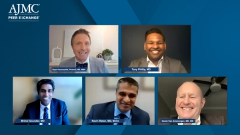
Multidisciplinary Care for Desmoid Tumors
Experts discuss the role of multidisciplinary teams, gene expression patterns, rare disease drug designation, and education gaps in managing desmoid tumors, emphasizing the need for comprehensive care and precision medicine.
Episodes in this series

This is a video synopsis/summary of a Peer Exchange involving Ryan Haumschild, PharmD, MS, MBA; Tony Phillip, MD; Mrinal Gounder, MD; Ravin Ratan, MD, MEd; and Derek Van Amerongen, MD, MS.
Haumschild discusses the challenge of diagnosing abdominal wall desmoid tumors associated with pregnancy, trauma, or hormonal changes. Gounder and Phillip share perspectives on obstetrician-gynecologist and general surgeon awareness, emphasizing the need for education. Van Amerongen underscores the significance of a multidisciplinary team in evaluating and treating desmoid tumors, highlighting the evolving treatment options and the importance of case sharing. Ratan emphasizes the expanding menu of treatment options, citing advancements that make previously ineligible tumors candidates for certain therapies. The discussion converges on the pivotal role of multidisciplinary care in optimizing patient outcomes.
Shifting focus, Van Amerongen clarifies that the Orphan Drug Act doesn’t affect coverage decisions for rare diseases. He emphasizes that health plans scrutinize all drug therapies uniformly, assessing clinical efficacy, safety, tolerability, and cost. The rarity of a condition doesn’t influence the level of scrutiny or approval, aligning with the goal of supporting the standard of care. The segment emphasizes the importance of comprehensive, patient-centric approaches in the management of desmoid tumors.
Video synopsis is AI generated and reviewed by AJMC® editorial staff.
Newsletter
Stay ahead of policy, cost, and value—subscribe to AJMC for expert insights at the intersection of clinical care and health economics.








